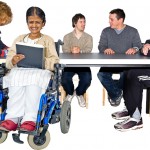
We have posted before about inclusive research projects, including the work of MyLife My Choice looking at annual health checks and work to involve and engage people in secure settings in research findings.
The authors of this study worked with people involved in research about how they support each other. They were looking at a model of peer support known as Mutual Supportand focused on individual narratives. The research team drew together the individual narratives to form a collective model of support.
The authors suggest the approach they took shows that the collective model of support fits well within the self-advocacy and involvement movements.
The themes that emerged included the ways in which people listened and the nature of support they offered in hard times and how working as a team enabled all members of the team to learn new coping strategies.
The authors set out a number of positive effects of Mutual Support they believe have emerged from the study, including
- people being able to participate more fully;
- ambitions being fulfilled;
- people who have been mentored becoming mentors themselves;
- dignity and respect being reclaimed.
They conclude by stating that their findings reinforce the view that
as an example of empowerment through participation, peer support by and for people with learning difficulties has emancipatory potential.
Mutual Support: a model of participatory support by and for people with learning difficulties, Keyes, S & Brandon, T in British Journal of Learning Disabilities, 40: 222–228.
